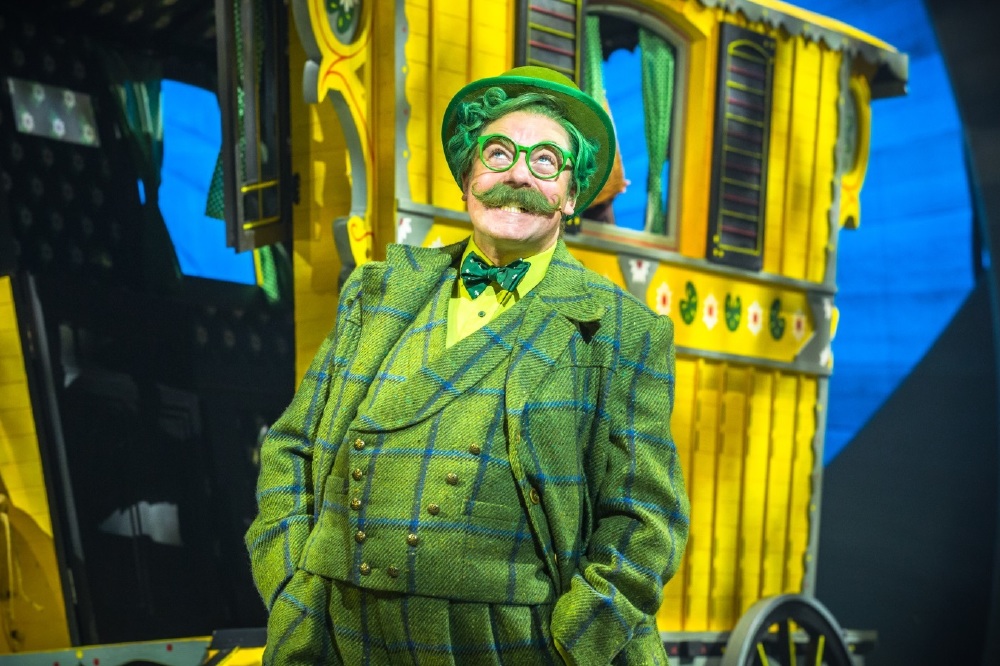By Theo Bosanquet

Rufus Hound in The Wind in the Willows
How did you first encounter The Wind in the Willows?
It's always been a very special story in my life, for a very particular reason. When I was a young boy I had trouble sleeping. My mum and dad tried a few things to help me and the one that stuck was story tapes. One day they got me the story of The Wind in the Willows as read by Kenneth Williams. I found it absolutely extraordinary and I listened to it for years. So I heard it hundreds, possibly thousands of times, and have recently rediscovered it anew as an adult.
What is it about the story you connected to?
Like many people I've always felt deeply connected to the trials and tribulations of those characters. And now I've got children of my own I've begun to read it to them and found other layers. As a child you tend to compare yourself to the animals and wonder whether you're more like Ratty or Toad, but as an adult you see that it's a bit more holistic than that. It's about the statuses of the different characters and the natural order and so on. But I prefer my childhood interpretation; fundamentally it's a timeless story of friendship.
How true is this adaptation?
As soon as I got into rehearsals I could see that the story we are telling in this production is one of fraternity, companionship and decency. In other words, everything I loved about The Wind in the Willows when I was a child. Add the sensational music by Stiles and Drewe, brilliant book by Julian Fellowes and the stunning designs by Peter McKintosh and the whole thing begins to feel scintillating. After the first day I thought it felt good, within a week I thought 'this could be very good' and after a month I was thinking 'this is going to be something stand out sensational'.
How are you approaching the character of Toad?
If Moley is the everyman of the story, Toad represents anarchy and excitement. He's never quite satisfied with his position, always striving for bigger, better and brighter things. I've found it interesting to explore why he feels like that. He hasn't ever had to do anything for himself, and as such his understanding of the world is very different. If he breaks something somebody else tidies it up - there isn't the usual cause and effect. He's never been held accountable. If you had grown up like that you would be pretty monstrous, and with that in mind I think Toad is actually a pretty good egg. He wants to have friends and share his world. I like that quality in him and it's one I understand - I'd have my house full of friends every weekend if I could.
Is there an added pressure taking on a character who exists so strongly in our imaginations?
You have to consider that people have certain expectations of Toad. As much as you might want to explore the darker aspects of his character, he also has to be a joyous presence who comes on and knocks your socks off. This isn't new writing; people will have feelings about this story before they sit down. So you can't change the cloth altogether as audiences would feel let down. These are characters people love and want to introduce to their kids. If you can't respect that and give it 100% every time, you shouldn't be doing it.
You've had great success in musical theatre; has it always been a genre you enjoy?
When I was at school I did quite a few shows and was in the school choir. I've always enjoyed the thrill of singing as part of a group and that is undoubtedly a huge part of the appeal of performing in musicals. But the thing about theatre is that it's a truly primal art form. Cave men would have acted out stories to each other. It's an integral part of life, and I've always wanted to be part of the gang that is telling stories, however they're being told. The songs and the jokes are just a way of enhancing the storytelling.
Are you excited to be taking the production on the road (poop poop!)?
Absolutely! Going on tour can be tough when you have a young family, but it means that all your focus is on the job in hand; there are no distractions. To be living solely for the work is a very fortunate position to be in and is the ideal way to start a new project. Plus it means we get to perform on a range of big, brilliant stages to audiences that have a track record for being discerning and very appreciative of the good stuff. You don't really get better job than that.
THE WIND IN THE WILLOWS
Website: www.windinthewillowsthemusical.com Facebook: \WillowsMusical Twitter: @WillowsMusical Instagram: \WillowsMusical
8th October 2016 - 22nd October 2016 THEATRE ROYAL, PLYMOUTH www.theatreroyal.com 01752 267 222
27th October 2016 - 6th November 2016 THE LOWRY, SALFORD
www.thelowry.com 0843 208 6000
10th November 2016 - 20th November 2016 MAYFLOWER THEATRE, SOUTHAMPTON www.mayflower.org.uk 02380 711811
Tagged in Rufus Hound

